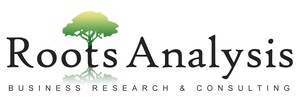Owing to their ability to act as drug carriers for complex, albeit highly promising therapeutics, lipid nanoparticles have emerged as a promising technology for drug delivery, offering several advantages, such as improved bioavailability, targeted delivery, and reduced toxicity
LONDON, Aug. 10, 2023 /PRNewswire/ -- Roots Analysis has announced the addition of "Lipid Nanoparticles in Drug Delivery: Intellectual Property Landscape" report to its list of offerings.
Lipid nanoparticles possess unique physical and chemical properties and have emerged as the principal excipient for the delivery of various types of therapeutics, including small molecules, gene therapies, proteins, peptides and DNA / RNA. With increasing research and development efforts, use of lipid nanoparticles in therapeutics has the potential to revolutionize drug delivery and address unmet medical needs. Their development can lead to more efficient and effective treatment options for patients.
To order this 170+ slides report, which features 110+ figures and 5+ tables, please visit
https://www.rootsanalysis.com/reports/lipid-nanoparticles-ip-landscape.html
Key Market Insights
More than 5,600 intellectual property (IP) publications related to lipid nanoparticles in drug delivery have been published
These IP publications represent more than 2,600 simple patent families; of which, close to 20% have received approval. It is worth mentioning that the majority of patent families (41%) have more than 10 years left for expiration.
Around 20 prominent keywords represent the primary focus area of the IP publications
The word vaccine appeared in titles of close to 30% publications, followed by method (23%). Further, other keywords that were prominent include composition, delivery, drug and lipid. It is worth noting that the appearance of these keywords in publications has significantly increased post-2020.
Close to five unique innovation categories represent over 2,600 simple families
Innovations featuring lipid nanoparticle and liposome compositions emerged as the most prominent innovation category, followed by innovations featuring lipid nanoparticle and liposomal formulation methods. It is worth highlighting that over 60% of the sub-innovation categories (of granted patents) have high degree of freedom to operate.
Over 60 publications emerged as the most valuable IP documents, covering recent innovations
More than 80% of these highly valuable intellectual property publications (Rank 1) have been approved; majority of these have more than 100 citations. It is worth noting that all of these patents were filed / granted in the US jurisdictions.
Around 20 CPC symbols emerged as key pockets of innovation
These represent 10 CPC families, of which A61K has emerged as the most frequently appearing CPC symbol, followed by A61P. Further, within the A61K CPC family, A61K9/127 emerged as the most prominent CPC code, being used to classify more than 650 patents filed across various jurisdictions.
More than 100 white spaces (possible areas of innovations) are present across different innovation categories
Majority of the innovations are focused on different methods of formulations and compositions of lipid nanoparticles used in drug delivery. Further, various areas, such as lipid nanoparticle formulations for mRNA vaccines and gene therapies, formulations for increasing vaccine immunogenicity and formulations for penetrating the blood-brain barrier, possess a high scope for innovation.
To request a sample copy / brochure of this report, please visit
https://www.rootsanalysis.com/reports/lipid-nanoparticles-ip-landscape.html
Key Questions Answered
- Who are the leading industry players having the maximum intellectual property related to lipid nanoparticles?
- What are the areas of white spaces in this market?
- What is the relative valuation of intellectual property related to lipid nanoparticles in drug delivery?
- How many patents focused on lipid nanoparticles in drug delivery are close to expiration?
- What are the various pockets of innovation in lipid nanoparticles in drug delivery domain?
- Which are the key elements that claims analysis for granted patent highlight?
- Which innovation areas have high freedom to operate?
The "Lipid Nanoparticles in Drug Delivery: Intellectual Property Landscape" report features an extensive study of the key intellectual property (IP) documents (featuring granted patents, patent applications and other documents), covering the wide range of innovations and advancements related to lipid nanoparticles, and unveiling their various applications and transformative potential in revolutionizing drug delivery strategies. The insights generated in this report have been presented across two deliverables, an MS Excel workbook and a MS PowerPoint deck, summarizing the ongoing activity in this domain.
The research includes detailed profiles of 10 key players (listed below); the profiles feature an overview of the developer (including information on key executives), its financial information (if available), key contributions to the field of lipid nanoparticles, recent developments and an informed future outlook.
- GlaxoSmithKline (GSK)
- Moderna
- CureVac
- Merck
- Sanofi
- Takeda
- Pfizer
- BioNTech
- Baxter
- eTheRNA
For additional details, please visit
https://www.rootsanalysis.com/reports/lipid-nanoparticles-ip-landscape.html or email [email protected]
You may also be interested in the following titles:
- Autoinjectors: Intellectual Property Landscape
- 3D Bioprinting: Intellectual Property Landscape
- Molecular Switches: Intellectual Property Landscape
Contact:
Gaurav Chaudhary
+1 (415) 800 3415
+44 (122) 391 1091
[email protected]
Logo: https://mma.prnewswire.com/media/742223/Roots_Analysis_Logo.jpg
SOURCE Roots Analysis

WANT YOUR COMPANY'S NEWS FEATURED ON PRNEWSWIRE.COM?
Newsrooms &
Influencers
Digital Media
Outlets
Journalists
Opted In



Share this article